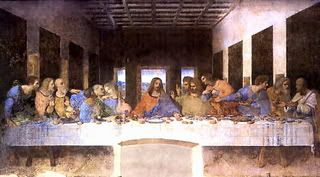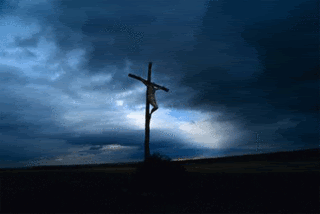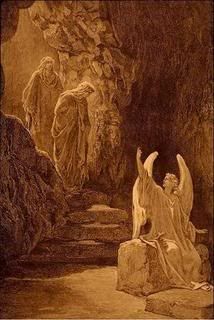
Today is
Maundy Thursday.
The feast or holy day on the Thursday before Easter that commemorates the Last Supper of Jesus Christ with the Apostles.
Tomorrow is
Good Friday.
Commemorates the crucifixion and death of Jesus at Calvary.
Sunday is
Easter.
It celebrates the resurrection of Jesus, which occurred on the third day after his death by crucifixion.
A little reading for you regarding the season that is upon us. ...
“But on the first day of the week, at early dawn, they went to the tomb, taking the spices which they had prepared. And they found the stone rolled away from the tomb, but when they went in they did not find the body. While they were perplexed about this, behold, two men stood by them, in dazzling apparel; and as they were frightened and bowed their faces to the ground, the men said to them, ‘Why do you seek the living among the dead? He is not here, but has risen’.” —Luke 24:1-5
 “It is the right as well as the duty of all men in society, publicly and at stated seasons, to worship the Supreme Being, the great Creator and Preserver of the universe. And no subject shall be hurt, molested, or restrained in his person, liberty, or estate, for worshipping God in the manner and season most agreeable to the dictates of his own conscience...” —The Massachusetts Bill of Rights
“It is the right as well as the duty of all men in society, publicly and at stated seasons, to worship the Supreme Being, the great Creator and Preserver of the universe. And no subject shall be hurt, molested, or restrained in his person, liberty, or estate, for worshipping God in the manner and season most agreeable to the dictates of his own conscience...” —The Massachusetts Bill of Rights
“It costs God nothing, so far as we know, to create nice things: but to convert rebellious wills cost him crucifixion... You must make your choice. Either this man was, and is, the Son of God, or else a madman or something worse... You can shut him up for fool, you can spit at him and kill him as a demon; or you can fall at his feet and call him Lord and God.” —C.S. Lewis

Thanks to
The Patriot Post for the material in this post.
At this season, Christians memorialize the crucifixion of Jesus Christ on Good Friday, and His rising from death on Easter morning. The Resurrection is the central fact that distinguishes Christianity from all other faiths, and we meditate these days on the way to and from the empty tomb.
In Christian theology, Christ’s sacrifice on the cross was the fusion of perfect love and perfect justice, vanquishing evil, in this sense: Because we owe God complete obedience, we have no means to make restitution for our sins. Doing what we should in any instance merely zeroes our balance for that act; we have no way to repay the negative sum of our accumulated sins. Only God Himself could rectify that moral debt on our behalf, in a sacrificial act that is simultaneously purely loving and purely just. One death thus gave each human life forever after an incalculable value, because of that exchange.
Jesus further commanded His believers to follow Him in self-sacrifice: “And when He had called the people to Him, with His disciples also, He said to them, ‘Whoever desires to come after Me, let him deny himself, and take up his cross, and follow Me”’ (Mark 8:34). “And he who does not take his cross and follow after Me is not worthy of Me” (Matthew 10:38). Clearly, Jesus calls His followers to lay down the life of this world and follow Him on the road to the cross.
What lay behind, in the shadow of the cross, was a barbaric world. Life during Christ’s time on earth was cheap, treated as suitable for sport and spectacle. The execution of Jesus by crucifixion typified the cruelty and capriciousness of Roman rule. The Jewish chief priests, arguing for the death of Jesus, clamored, “We have no king but Caesar” (John 19:15). The Roman governor, Pontius Pilate, knew that Jesus was guilty of no capital crime, for he said, “I wash my hands of the blood of this innocent man” —yet, fearing political repercussions should Caesar hear rumors of Jesus as a rival claimant to authority, Pilate permitted the death sentence to be carried out. ...
Many, possibly most, of our Founders were Christians, or else steeped in a political philosophy rooted in the Christian view of human nature. They believed, as we still do, that each individual human is a morally responsible being created in the image of God, and that the only government capable of enduring well is the one that honors this nature by ensuring liberty; the one that is dedicated to principles rooted in the Easter view of human worth. “The God who gave us life, gave us liberty at the same time,” wrote Thomas Jefferson; “the hand of force may destroy, but cannot disjoin them.”
At the far end of the road to the cross lies the empty tomb—the promise of resurrection and eternal life. Even today, the empty tomb beckons. Will we travel the way of the cross, or take another road?
Joe
 Today is Maundy Thursday.
Today is Maundy Thursday.“It is the right as well as the duty of all men in society, publicly and at stated seasons, to worship the Supreme Being, the great Creator and Preserver of the universe. And no subject shall be hurt, molested, or restrained in his person, liberty, or estate, for worshipping God in the manner and season most agreeable to the dictates of his own conscience...” —The Massachusetts Bill of Rights
 Thanks to The Patriot Post for the material in this post.
Thanks to The Patriot Post for the material in this post.







No comments:
Post a Comment